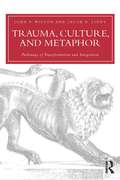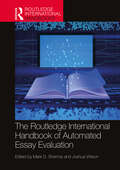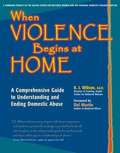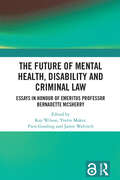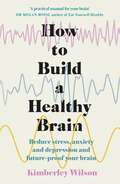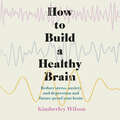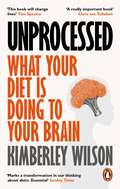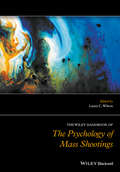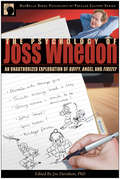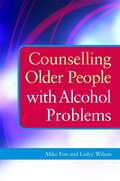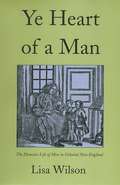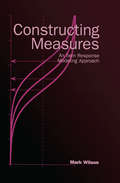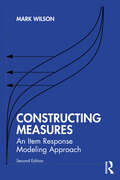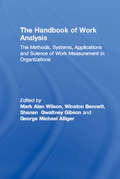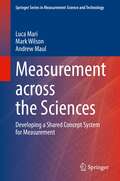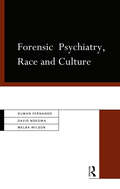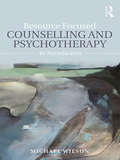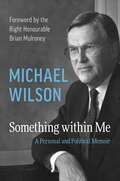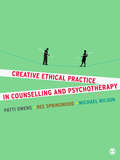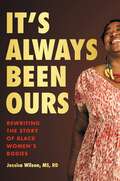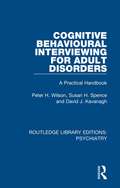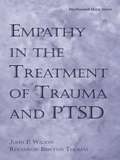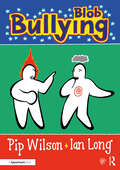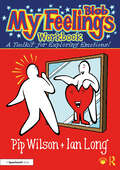- Table View
- List View
Trauma, Culture, and Metaphor: Pathways of Transformation and Integration (Psychosocial Stress Series)
by John P. Wilson Jacob D. LindyIn Trauma, Culture, and Metaphor, John Wilson and Jacob Lindy explore the language of both individual and collective trauma in an era dominated by globalization and interconnectedness. Through lucid, careful discussion, this important book builds a bridge between the etymology of trauma-related terms commonly used in Western cultures and those of other cultures, such as the Burundi-Rwandan ihahamuka. It also provides the clinician with a framework for working with trauma survivors using a cross-cultural vocabulary—one often based in metaphor—to fully address the experienced trauma and to begin work on reconnection and self-reinvention.
The Routledge International Handbook of Automated Essay Evaluation (Routledge International Handbooks)
by Joshua Wilson Mark D. ShermisThe Routledge International Handbook of Automated Essay Evaluation (AEE) is a definitive guide at the intersection of automation, artificial intelligence, and education. This volume encapsulates the ongoing advancement of AEE, reflecting its application in both large-scale and classroom-based assessments to support teaching and learning endeavors.It presents a comprehensive overview of AEE's current applications, including its extension into reading, speech, mathematics, and writing research; modern automated feedback systems; critical issues in automated evaluation such as psychometrics, fairness, bias, transparency, and validity; and the technological innovations that fuel current and future developments in this field. As AEE approaches a tipping point of global implementation, this Handbook stands as an essential resource, advocating for the conscientious adoption of AEE tools to enhance educational practices ethically. The Handbook will benefit readers by equipping them with the knowledge to thoughtfully integrate AEE, thereby enriching educational assessment, teaching, and learning worldwide.Aimed at researchers, educators, AEE developers, and policymakers, the Handbook is poised not only to chart the current landscape but also to stimulate scholarly discourse, define and inform best practices, and propel and guide future innovations.
When Violence Begins at Home: A Comprehensive Guide to Understanding and Ending Domestic Abuse
by K. J. WilsonSince its initial publication, this far-reaching reference has provided professionals and victims of abuse with guidance on everything from indicators of an abusive relationship to domestic violence legislation, from antiburnout tips for helpers to advice on leaving an abusive partner. This updated edition addresses new research and programs, adding information on date rape drugs, stalking, cyber-stalking, pregnancy and domestic violence, and the effectiveness of batterer intervention programs. Current controversial social and legal issues such as mutual battering, child welfare and "failure to protect" policies, child custody and visitation rights for batterers, mandatory arrests, and welfare reform are also covered. Two new chapters devote attention to domestic violence in the military and to the challenging and rewarding role of those who work with battered women and their children. New resources have been included to reflect the ever-evolving wealth of books, web sites, and agencies available to both helpers and those in need.
The Future of Mental Health, Disability and Criminal Law
by Kay Wilson Yvette Maker Piers Gooding Jamie WalvischThis book brings together contributions from twenty-three world-leading scholars and commentators that address a range of contemporary and pressing international themes in mental health, disability and criminal law. The authors use the work of internationally renowned academic, Emeritus Professor Bernadette McSherry, as a springboard to reflect on recent developments in these areas of law and to anticipate the future directions they may take. In doing so, they aim to inform and inspire a new generation of mental health, disability and criminal law scholars, advocates and reformers. The book is divided into four substantive sections: reforming mental health and disability law; regulating coercion and restrictive practices; improving access to justice and the criminal law; and transforming mental health law. It also includes an introduction from the editors and an afterword from Emeritus Professor McSherry. The book is aimed at regulators, policymakers, lawyers, clinicians, consumer advocates and academics who are interested in the urgent and contentious issues surrounding the reform and development of mental health, disability and criminal law. It will help them understand the key issues and problems and presents suggestions for reform. The book is interdisciplinary and international in its focus.
How to Build a Healthy Brain: Reduce stress, anxiety and depression and future-proof your brain
by Kimberley Wilson'A practical manual for your brain.' - Dr Megan Rossi, author of Eat Yourself HealthyA groundbreaking science-based guide to protecting your brain health for the long term.Whatever your age, having a healthy brain is the key to a happy and fulfilled life. Yet, for both young and old, diseases of the brain and mental health are the biggest killers in the 21st century. We all know how to take care of our physical health, but we often feel powerless as to what we can do to protect our mental well-being too.How to Build a Healthy Brain is here to help. Written by a passionate advocate for the importance of mental health, Chartered Psychologist Kimberley Wilson draws on the latest research to give practical, holistic advice on how you can protect your brain health by making simple lifestyle choices. With chapters on Sleep, Nutrition, Exercise and Meditation, Kimberley has written an empowering guide to help you look after both your physical and mental well-being.'Finally, a book that puts the brain at the centre of the health conversation, where it belongs.' - Shona Vertue, author of The Vertue Method'A psychologist, she runs a successful private clinic in central London, combining therapy with nutrition advice, and has just written her first (excellent) book, How to Build a Healthy Brain, about protecting our mental wellbeing through factors such as diet, sleep and exercise.' - The Times 'I love your book ... it made me equal parts really excited and passionate, and also pretty angry. The science is there but it isn't being translated. This is a huge area that affects us all ... your book is absolutely brilliant at explaining what we can do to look after our brain health.' - Ella Mills on Deliciously Ella: The Podcast
How to Build a Healthy Brain: Reduce stress, anxiety and depression and future-proof your brain
by Kimberley Wilson'A practical manual for your brain.' - Dr Megan Rossi, author of Eat Yourself HealthyA groundbreaking science-based guide to protecting your brain health for the long term.Whatever your age, having a healthy brain is the key to a happy and fulfilled life. Yet, for both young and old, diseases of the brain and mental health are the biggest killers in the 21st century. We all know how to take care of our physical health, but we often feel powerless as to what we can do to protect our mental well-being too.How to Build a Healthy Brain is here to help. Written by a passionate advocate for the importance of mental health, Chartered Psychologist Kimberley Wilson draws on the latest research to give practical, holistic advice on how you can protect your brain health by making simple lifestyle choices. With chapters on Sleep, Nutrition, Exercise and Meditation, Kimberley has written an empowering guide to help you look after both your physical and mental well-being.'Finally, a book that puts the brain at the centre of the health conversation, where it belongs.' - Shona Vertue, author of The Vertue Method'A psychologist, she runs a successful private clinic in central London, combining therapy with nutrition advice, and has just written her first (excellent) book, How to Build a Healthy Brain, about protecting our mental wellbeing through factors such as diet, sleep and exercise.' - The Times 'I love your book ... it made me equal parts really excited and passionate, and also pretty angry. The science is there but it isn't being translated. This is a huge area that affects us all ... your book is absolutely brilliant at explaining what we can do to look after our brain health.' - Ella Mills on Deliciously Ella: The Podcast
How to Build a Healthy Brain: Reduce stress, anxiety and depression and future-proof your brain
by Kimberley WilsonA groundbreaking science-based guide to protecting your brain health for the long term.Whatever your age, having a healthy brain is the key to a happy and fulfilled life. Yet, for both young and old, diseases of the brain and mental health are the biggest killers in the 21st century. We all know how to take care of our physical health, but we often feel powerless as to what we can do to protect our mental well-being too.How to Build a Healthy Brain is here to help. Written by a passionate advocate for the importance of mental health, Chartered Psychologist Kimberley Wilson draws on the latest research to give practical, holistic advice on how you can protect your brain health by making simple lifestyle choices. With chapters on Sleep, Nutrition, Exercise and Meditation, Kimberley has written an empowering guide to help you look after both your physical and mental well-being.(P) 2020 Hodder & Stoughton Ltd
Unprocessed: How the Food We Eat Is Fuelling Our Mental Health Crisis
by Kimberley WilsonWe all know that as a nation our mental health is in crisis. But what most don't know is that a critical ingredient in this debate, and a crucial part of the solution - what we eat - is being ignored.Nutrition has more influence on what we feel, who we become and how we behave than we could ever have imagined. It affects everything from our decision-making to aggression and violence. Yet mental health disorders are overwhelmingly treated as 'mind' problems as if the physical brain - and how we feed it - is irrelevant. Someone suffering from depression is more likely to be asked about their relationship with their mother than their relationship with food.In this eye-opening and impassioned book, psychologist Kimberley Wilson draws on startling new research - as well as her own work in prisons, schools and hospitals around the country - to reveal the role of food and nutrients in brain development and mental health: from how the food a woman eats during pregnancy influences the size of her baby's brain, and hunger makes you mean; to how nutrient deficiencies change your personality.We must also recognise poor nutrition as a social injustice, with the poorest and most vulnerable being systematically ignored. We need to talk about what our food is doing to our brains. And we need decisive action, not over rehearsed soundbites and empty promises, from those in power - because if we don't, things can only get worse.
The Wiley Handbook of the Psychology of Mass Shootings (Wiley Clinical Psychology Handbooks)
by Laura C. WilsonThe Wiley Handbook of the Psychology of Mass Shootings gathers together the latest insights from research and practice in one timely and much-needed reference work. The first full-length academic examination of mass shootings from a psychological perspective Contains 21 essays written by a global team of experts Covers a broad range of topics, including the psychology of perpetrators, the role of the media, psychological considerations and clinical interventions for affected individuals, prevention, ethical issues, and areas for future research Provides best practices for clinicians, academics, and policymakers dealing with these increasingly prevalent incidents of violence
The Psychology of Joss Whedon: An Unauthorized Exploration of Buffy, Angel, and Firefly
by Leah Wilson Joy DavidsonFirst there was "Buffy the Vampire Slayer"; then its spin-off "Angel"; then the cult hit "Firefly"; and its follow-up film, "Serenity." They all had two things in common: their creator, Joss Whedon ... and their surprising psychological depth.Revisit the worlds of Joss Whedon ... with trained psychologists at your side. What are the psychological effects of constantly fighting for your life? Why is neuroscience the Whedonverse's most terrifying villain? How can watching Joss's shows help you take on your own psychological issues?It's all the best parts of Psych 101--without Professor Walsh.* Robert Kurzban explains how Mal's morals are a form of evolutionary pornography, and why we like to watch* Thomas Flamson explores free will in the Whedonverse--with prophecies, sacred duties and the long arm of the Alliance, does anyone actually have any?* Carole Poole demonstrates how Buffy and Spike's season six relationship could be considered metaphor for narcissistic personality disorder--and concludes that Buffy may have been better off continuing it* Bradley J. Daniels looks at River's Alliance-altered brain, and the real effects of "stripping" the amygdala* Mikhail Lyubansky shows why, psychologically, death really is Buffy's gift* And editor Joy Davidson takes on Angel's mommy issues--how the course of his whole extraordinary existence can be traced back to the woman who made him a vampire
Counselling Older People with Alcohol Problems
by Lesley Wilson Mike FoxAlcohol misuse is becoming an increasingly significant issue for people aged 55 and over, and providing effective counselling services to this growing client group requires a unique and specialised approach. This practical guide explores the factors that differentiate older drinkers, and introduces an innovative person-centred model that will help counsellors and other healthcare professionals to give older people with alcohol problems the help and support they need. Older people with alcohol problems often have complex personal histories, and are particularly vulnerable to long-term dependency, social isolation and self-medication. This book explores the influences, patterns and triggers that affect the development and progression of alcohol dependency in this age group, and provides a detailed description of a theoretical model and therapeutic process that has proved successful in practice. Informative case studies demonstrate the approach in action and guidance is also given for working with clients with dementia or mental health problems. This book will prove an invaluable resource for counsellors and other healthcare professionals who encounter alcohol problems in their clinical practice, including clinical psychologists, social workers, occupational therapists and community psychiatric nurses.
Ye Heart Of A Man: The Domestic Life Of Men In Colonial New England
by Lisa WilsonAn investigation of the everyday lives of men in pre-revolutionary America. It looks at men and women in colonial Massachusetts and Connecticut, comparing their experiences in order to understand the domestic environment in which they spent most of their time. The author uses letters, diaries and court records to describe how men thought of themselves, their wives, children and parents. This is a social history of New England during the sixteen and seventeen hundreds prior to the Revolution. Examines men's roles as husband, father, son and provider.
Constructing Measures: An Item Response Modeling Approach
by Mark WilsonConstructing Measures introduces a way to understand the advantages and disadvantages of measurement instruments, how to use such instruments, and how to apply these methods to develop new instruments or adapt old ones. The book is organized around the steps taken while constructing an instrument. It opens with a summary of the constructive steps involved. Each step is then expanded on in the next four chapters. These chapters develop the "building blocks" that make up an instrument--the construct map, the design plan for the items, the outcome space, and the statistical measurement model. The next three chapters focus on quality control. They rely heavily on the calibrated construct map and review how to check if scores are operating consistently and how to evaluate the reliability and validity evidence. The book introduces a variety of item formats, including multiple-choice, open-ended, and performance items; projects; portfolios; Likert and Guttman items; behavioral observations; and interview protocols.Each chapter includes an overview of the key concepts, related resources for further investigation and exercises and activities. Some chapters feature appendices that describe parts of the instrument development process in more detail, numerical manipulations used in the text, and/or data results. A variety of examples from the behavioral and social sciences and education including achievement and performance testing; attitude measures; health measures, and general sociological scales, demonstrate the application of the material. An accompanying CD features control files, output, and a data set to allow readers to compute the text's exercises and create new analyses and case archives based on the book's examples so the reader can work through the entire development of an instrument.Constructing Measures is an ideal text or supplement in courses on item, test, or instrument development, measurement, item response theory, or rasch analysis taught in a variety of departments including education and psychology. The book also appeals to those who develop instruments, including industrial/organizational, educational, and school psychologists, health outcomes researchers, program evaluators, and sociological measurers. Knowledge of basic descriptive statistics and elementary regression is recommended.
Constructing Measures: An Item Response Modeling Approach
by Mark WilsonConstructing Measures introduces a way to understand the advantages and disadvantages of measurement instruments. It explains the ways to use such instruments, and how to apply these methods to develop new instruments or adapt old ones, based on item response modeling and construct references. Now in its second edition, this book focuses on the steps taken while constructing an instrument, and breaks down the "building blocks" that make up an instrument—the construct map, the design plan for the items, the outcome space, and the statistical measurement model. The material covers a variety of item formats, including multiple-choice, open-ended, and performance items, projects, portfolios, Likert and Guttman items, behavioral observations, and interview protocols. Each chapter includes an overview of the key concepts, related resources for further investigation, and exercises and activities. A variety of examples from the behavioral and social sciences and education—including achievement and performance testing, attitude measures, health measures, and general sociological scales—demonstrate the application of the material. New to this edition are additional example contexts including a cognitive/achievement example, an attitude example, and a behavioral example and new concentrations on specific measurement issues and practices such as standard-setting, computer-delivery and reporting, and going beyond the Likert response format. Constructing Measures is an invaluable text for undergraduate and graduate courses on item, test, or instrument development; measurement; item response theory; or Rasch analysis taught in a variety of departments, including education, statistics, and psychology. The book also appeals to practitioners who develop instruments, including industrial/organizational, educational, and school psychologists; health outcomes researchers; program evaluators; and sociological measurers.
The Handbook of Work Analysis: Methods, Systems, Applications and Science of Work Measurement in Organizations (Applied Psychology Series)
by Mark A. Wilson Winston Bennett Shanan G. Gibson George M. Alliger Erich C. Dierdorff Suzanne Tsacoumis Robert J. Harvey Gregory M. HurtzThis new handbook, with contributions from experts around the world, is the most comprehensive treatise on work design and job analysis practice and research in over 20 years. The handbook, dedicated to Sidney Gael, is the next generation of Gael’s successful Job Analysis Handbook for Business, Industry and Government, published by Wiley in 1988. It consists of four parts: Methods, Systems, Applications and Research/Innovations. Finally, a tightly integrated, user-friendly handbook, of interest to students, practitioners and researchers in the field of Industrial Organizational Psychology and Human Resource Management. Sample Chapter available: Chapter 24, Training Needs Assessment by Eric A. Surface is available for download.
Measurement across the Sciences: Developing a Shared Concept System for Measurement (Springer Series in Measurement Science and Technology)
by Mark Wilson Luca Mari Andrew MaulThis book proposes a conceptual framework for understanding measurement across a broad range of scientific fields and areas of application, such as physics, engineering, education, and psychology. The authors, who themselves span these disciplines, argue that the justification of the public trust attributed to measurement results can in principle apply identically to both physical and psychosocial properties. They further argue that the lack of a common conceptualization of measurement hampers interdisciplinary communication and limits the ability to share knowledge. They advance their views by first surveying the conceptual history of the philosophy of measurement and arguing that classical, operationalist and representational perspectives on measurement each make important contributions but also each have important shortcomings. A synthesis is then offered as the foundation for a new conceptual framework. The authors describe how the framework, which operates as a shared concept system, supports understanding measurement’s work in different domains, using examples in the physical and human sciences. They consider connections and consequences with respect to causality, objectivity, and intersubjectivity, among other topics, and how measurement science concepts and issues are construed across these disciplines and settings. They also address contemporary issues and controversies within measurement in the light of the framework, including operationalism, definitional uncertainty, and the relations between measurement and computation. The book concludes with a justification for the basic claim that measurement is an empirical and informational process that produces explicitly justifiable information. Researchers and academics across a wide range of disciplines including biological, physical, social and behavioral scientists, as well as specialists in measurement and philosophy will appreciate the work’s fresh and provocative approach to the field at a time when sound measurements of complex scientific systems are increasingly essential to solving critical global problems.
Forensic Psychiatry, Race and Culture
by Melba Wilson Suman Fernando David Ndegwa Dr Suman FernandoForensic psychiatry is the discipline which distinguishes the 'mad' from the 'bad', but are its values inherently racist? Why are individuals from non-Western backgrounds over-represented statistically in those diagnosed with schizophrenia and other serious illnesses? The authors argue that the values on which psychiatry is based are firmly rooted in ethnocentric Western culture, with profound implications for individual diagnosis and systems of care.Through detailed exploration of the history of psychiatry, current clinical issues and present public policy, this powerful book traces the growth of a system in which non-conformity to the prevailing cultural norms risks alienation and diagnosis of mental disorder.
Resource Focused Counselling and Psychotherapy: An Introduction
by Michael WilsonTherapists sometimes ask: What supports you in life? What gets you through difficult times? Our ‘journey’ in life relies on a range of resources to equip and fulfil us. Knowing about these resources, however, is not enough: for lasting benefits, they must be bodily felt experiences. The aim of this book is to illustrate the holistic purpose of therapy to resource integration of the client. It draws upon extensive material to affirm that the practice of contemporary therapy benefits from insights gained from evolving neuroscience. Particular emphasis is put on the benefits of drawing on the dimensions of experience to strengthen ego processes like self-awareness and self-regulation, and engage with the depths of being, including ‘soul’. Resource Focused Counselling and Psychotherapy provides professionals with a comprehensive and integrative model of resource focused therapy, drawing upon clinical examples and the current range of research and theory surrounding this emerging approach. Additionally, the book contains a range of self-resourcing exercises and practices for each part of the integrative model, enabling individuals to develop self-resources for greater resilience and well-being in their own lives. This book is an important read for psychotherapists, psychologists and counsellors, including those working with trauma. It also provides valuable insights for modalities practising from a psycho-spiritual perspective, including Jungian and transpersonal psychotherapists.
Something within Me: A Personal and Political Memoir
by Michael WilsonThe late Honourable Michael Wilson was a Canadian politician and business professional. As Minister of Finance under Brian Mulroney, Wilson was one of the key negotiators of the Canada-United States Free Trade Agreement – one of Canada’s most important economic agreements in the last 50 years, later superseded by NAFTA. In addition, Wilson was responsible for implementing the controversial Goods and Services Tax (GST), which remains key to the federal government today. After his life in Parliament, Wilson served as Ambassador to the United States and Chancellor of the University of Toronto. Outside of politics, Wilson was active in raising awareness of mental health issues following the traumatic loss of his son, Cameron, to suicide. Devoting considerable time to advocacy, he established the Cameron Parker Holcombe Wilson Chair in Depression Studies at the University of Toronto and served as Board Chair for the Mental Health Commission of Canada. Something within Me highlights how Wilson’s personal life blended with his political life and accomplishments, detailing his advocacy for mental health awareness as well his involvement in important pieces of legislation that made significant impacts in Canadian political and economic history. These deeply personal stories, particularly those of a father grappling with his son’s illness and death, remind us of the lives behind the political personas that shape our world.
Creative Ethical Practice in Counselling & Psychotherapy
by Michael Wilson Patti Owens Ms Bee SpringwoodCan I be a creative therapist without overstepping boundaries and risking complaints? Can I practise safely and ethically whilst remaining true to my humanistic values? This book answers 'Yes' by offering a safety net to trainees and therapists working in the context of today's 'complaints culture'. Exploring what safe and creative practice means in relation to the key cornerstones in therapy, the authors offer practical guidance to assist the reader in reflecting on and negotiating the challenges of boundaries, legalities and defensive practice. Creative Ethical Practice for Counselling & Psychotherapy considers the necessary structures and processes that must inform creative, humanistic practice for it to be a safe, ethical therapeutic framework. Packed with reflective exercises, summaries, case examples and step-by-step guidance, this book takes the reader from establishing the therapeutic relationship to worst-case scenarios like complaints procedures and legal action. It is essential reading for legal & ethical modules on all counselling courses. Patti Owens, Michael Wilson and Bee Springwood are all humanistic and integrative therapists and members of the UK Association of Humanistic Psychology Practitioners (UKAHPP) as well as the United Kingdom Council for Psychotherapy (UKCP).
It's Always Been Ours: Rewriting the Story of Black Women's Bodies
by Jessica WilsonWE WILL REWRITE THE NARARTIVE OF BLACKNESS THAT CENTERS AND CELEBRATES OUR JOY. In It&’s Always Been Ours eating disorder specialist and storyteller Jessica Wilson challenges us to rethink what having a "good" body means in contemporary society. By centering the bodies of Black women in her cultural discussions of body image, food, health, and wellness, Wilson argues that we can interrogate white supremacy&’s hold on us and reimagine the ways we think about, discuss, and tend to our bodies. A narrative that spans the year of racial reckoning (that wasn't), It&’s Always Been Ours is an incisive blend of historical documents, contemporary writing, and narratives of clients, friends, and celebrities that examines the politics of body liberation. Wilson argues that our culture&’s fixation on thin, white women reinscribes racist ideas about Black women's bodies and ways of being in the world as "too much." For Wilson, this white supremacist, capitalist undergirding in wellness movements perpetuates a culture of respectability and restriction that force Black women to perform unhealthy forms of resilience and strength at the expense of their physical and psychological needs. With just the right mix of wit, levity, and wisdom, Wilson shows us how a radical reimagining of body narratives is a prerequisite to well-being. It&’s Always Been Ours is a love letter that celebrates Black women&’s bodies and shows us a radical and essential path forward to rediscovering their vulnerability and joy.
Cognitive Behavioural Interviewing for Adult Disorders: A Practical Handbook (Routledge Library Editions: Psychiatry #24)
by Peter H. Wilson Susan H Spence David J. KavanaghOriginally published in 1989, the primary aim of this text was to provide a guide to the interview assessment of a wide range of common adult psychological problems. Emphasis is placed on the kinds of problems that were frequently encountered in outpatient centres at the time. The authors provide a general introduction to the nature and causes of each of the selected problems, with a focus on the kind of background knowledge that may be useful in the planning of initial interviews and the selection of appropriate interventions. Detailed examples are provided of the questions that may help elicit information on the history, severity, and causes of the problems for individual clients, and there is also a brief discussion of selected formal assessment instruments for each problem area. A major aim of the text is to teach basic principles of problem identification, behavioural analysis and a structured approach to assessment.
Empathy in the Treatment of Trauma and PTSD (Psychosocial Stress Series)
by John P. Wilson, Ph.D. Rhiannon Brywnn Thomas, Ph.D.Empathy in the Treatment of Trauma and PTSD examines how professionals are psychologically impacted by their work with trauma clients. A national research study provides empirical evidence, documenting the struggle for professionals to maintain therapeutic equilibrium and empathic attunement with their trauma clients. Among the many important findings of this study, all participants reported being emotionally and psychologically affected by the work, often quite profoundly leading to changes in worldview, beliefs about the nature of humankind and the meaning of life.John P. Wilson and Rhiannon Thomas set out to understand how to heal those who experience empathic strain in the course of their professional specialization. The data included in the book allows for the development of conceptual dynamic models of effective management of empathic strain, which may cause vicarious traumatization, burnout and serious countertransference processes.
Blob Bullying (Blobs)
by Pip Wilson Ian LongThis practical and accessible resource contains a wealth of discussion sheets and games to help victims of bullying reflect and talk about their experiences and feelings using the internationally familiar Blob figures. Diverse and inclusive, the Blob figures are a proven way to help children and adults share their feelings and experiences. Without age, culture or gender, they enable the individual to focus on feelings and body language. In this book, the Blobs explore bullying. From Blob Trees to Bingo games, cards and emotional scales, the Blobs provide a visual structure that allows children, teenagers and adults to open up about being bullied. Offering unique activities that help scaffold conversations for people of all ages and abilities, this is an essential resource for teachers, teaching assistants, youth and social workers, psychologists, counsellors and all those who work with and have caring responsibilities for others.
My Blob Feelings Workbook: A Toolkit for Exploring Emotions! (Blobs)
by Pip Wilson Ian LongMy Blob Feelings Workbook provides the reader with a series of unique visual reflective exercises that help to reveal one’s own emotional portrait. Using a combination of Blob characters and open questions, the reader can gradually build up an image of themselves across a wide range of ‘who I am’ subjects and real-life scenarios. Packed with well-loved blob illustrations, this book includes a wealth of downloadable pages and will enable the individual to ‘draw’ a picture of themselves emotionally through the series of exercises. Sections covered include: • My Charts • My Feeling Scales • My Scenarios • Myself Scales Best used as a personal toolkit for self-awareness, this book is also a rich resource for professionals working in the field of feelings to use with their own clients. It is suitable for all ages from secondary school upwards and ideal for individuals, couples, groups and all who wish to go deeper in understanding their emotional strengths and areas for development.
